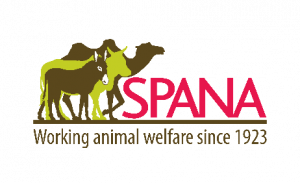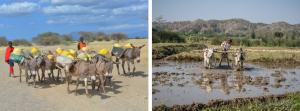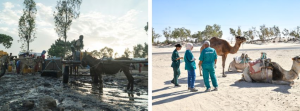SPANA Warns the Climate Crisis is Driving Working Animals and Communities to Collapse
LONDON, UNITED KINGDOM, October 3, 2024 /EINPresswire.com/ -- On this year’s World Animal Day, SPANA (the Society for the Protection of Animals Abroad) is calling on world leaders to consider working animals during the upcoming COP29 event in November.
In line with the theme of this year’s World Animal Day on 4 October 2024 (‘The world is their home too’), SPANA is shining a light on the often-overlooked impact of the climate emergency on working animals. The unpredictability of weather events, such as extreme heat and devastating flooding, is intensifying the hardship and suffering of working animals. This is contributing to a growing crisis that is threatening their wellbeing and very survival, and pushing vulnerable rural communities to the brink of collapse.
The emergency currently unfolding in Kenya’s Kajiado County, located south of Nairobi, near the border with Tanzania, is a clear example of this. In this Maasai region, the existence and daily survival of humans and animals is closely intertwined. Families rely on their donkeys to fetch water from distant sources, transport goods to markets, and support agricultural activities.
Earlier this year, unprecedented flooding devastated Maasai communities in Magadi and Shompole and severely impacted working animals.
With shelters destroyed and grazing land submerged, more than 4,400 donkeys were left exposed to extreme conditions and deadly diseases, triggering an economic and humanitarian disaster that deeply affected the local communities.
After the floods, contaminated water sources became a breeding ground for parasites and diseases that impacted both donkeys and humans. With veterinary services scarce in remote areas, the crisis escalated quickly.
In partnership with the African Network for Animal Welfare (ANAW), SPANA has been leading a critical emergency project in Kajiado County, delivering lifesaving veterinary care and vaccinations for affected working animals. This collaboration provided immediate relief and helped local Maasai communities to build resilience against future weather and climate-related disasters. This included setting up early warning systems, developing evacuation plans for animals, and providing education on weather prediction and emergency response.
Linda Edwards, Chief Executive of SPANA, commented:
"For communities like the Maasai, working animals are lifelines. When they’re lost or unable to work, daily life grinds to a halt. These animals are essential for reaching water, transporting goods, and sustaining the heartbeat of local economies.”
The disaster in Kenya is not an isolated incident – it is part of a growing interconnected global crisis. The UN’s One Health approach recognises the interdependence between human, animal and environmental health, emphasising that the health of one directly impacts the others. It acknowledges the connections between these three systems and advocates for collaborative, cross-sector solutions to tackle emerging health threats at their root.
Linda Edwards continued:
“With over 200 million working animals worldwide, SPANA’s work is essential in protecting these vital animals – the trucks, tractors, and taxis of rural communities. Without them, the foundation crumbles. Safeguarding and treating these animals isn’t just compassion – it’s essential to avoiding ecological and economic disaster.
“When animals suffer, ecosystems collapse. That’s why SPANA is calling on world leaders to consider the protection and care of working animals in their COP29 discussions. These animals are vital to sustainability, and their welfare must be part of the global climate agenda.”
For more information about SPANA’s work, please visit www.spana.org.
-ENDS-
Click to download images
Images show:
Top left: Working donkeys with members of the Maasai community in Kenya
Top right: Working cattle in Myanmar
Bottom left: Working donkeys in Ethiopia
Bottom right: A SPANA veterinary team administering medication to working camels in Tunisia.
Notes to editors:
• SPANA’s Chief Executive, Linda Edwards, is available to interview.
• High-res images can be downloaded from here: https://drive.google.com/drive/folders/1Y6KSlvEnc2XVSFb_q8qcvHpwa8nwLP3J?usp=sharing
• COP29 is taking place in Baku, Azerbaijan, between Monday 11 November and Friday 22 November 2024.
• World Animal Day takes place on Friday 4 October 2024.
SPANA (the Society for the Protection of Animals Abroad):
Established in 1923, SPANA’s goal is to transform the lives of horses, donkeys, mules, camels and other working animals in need. The charity improves the welfare of working animals in the world’s poorest communities by ensuring the treatment and care of animals, the training of animal owners, and the teaching of children about animal welfare. Find out more at www.spana.org
Media Contact:
In line with the theme of this year’s World Animal Day on 4 October 2024 (‘The world is their home too’), SPANA is shining a light on the often-overlooked impact of the climate emergency on working animals. The unpredictability of weather events, such as extreme heat and devastating flooding, is intensifying the hardship and suffering of working animals. This is contributing to a growing crisis that is threatening their wellbeing and very survival, and pushing vulnerable rural communities to the brink of collapse.
The emergency currently unfolding in Kenya’s Kajiado County, located south of Nairobi, near the border with Tanzania, is a clear example of this. In this Maasai region, the existence and daily survival of humans and animals is closely intertwined. Families rely on their donkeys to fetch water from distant sources, transport goods to markets, and support agricultural activities.
Earlier this year, unprecedented flooding devastated Maasai communities in Magadi and Shompole and severely impacted working animals.
With shelters destroyed and grazing land submerged, more than 4,400 donkeys were left exposed to extreme conditions and deadly diseases, triggering an economic and humanitarian disaster that deeply affected the local communities.
After the floods, contaminated water sources became a breeding ground for parasites and diseases that impacted both donkeys and humans. With veterinary services scarce in remote areas, the crisis escalated quickly.
In partnership with the African Network for Animal Welfare (ANAW), SPANA has been leading a critical emergency project in Kajiado County, delivering lifesaving veterinary care and vaccinations for affected working animals. This collaboration provided immediate relief and helped local Maasai communities to build resilience against future weather and climate-related disasters. This included setting up early warning systems, developing evacuation plans for animals, and providing education on weather prediction and emergency response.
Linda Edwards, Chief Executive of SPANA, commented:
"For communities like the Maasai, working animals are lifelines. When they’re lost or unable to work, daily life grinds to a halt. These animals are essential for reaching water, transporting goods, and sustaining the heartbeat of local economies.”
The disaster in Kenya is not an isolated incident – it is part of a growing interconnected global crisis. The UN’s One Health approach recognises the interdependence between human, animal and environmental health, emphasising that the health of one directly impacts the others. It acknowledges the connections between these three systems and advocates for collaborative, cross-sector solutions to tackle emerging health threats at their root.
Linda Edwards continued:
“With over 200 million working animals worldwide, SPANA’s work is essential in protecting these vital animals – the trucks, tractors, and taxis of rural communities. Without them, the foundation crumbles. Safeguarding and treating these animals isn’t just compassion – it’s essential to avoiding ecological and economic disaster.
“When animals suffer, ecosystems collapse. That’s why SPANA is calling on world leaders to consider the protection and care of working animals in their COP29 discussions. These animals are vital to sustainability, and their welfare must be part of the global climate agenda.”
For more information about SPANA’s work, please visit www.spana.org.
-ENDS-
Click to download images
Images show:
Top left: Working donkeys with members of the Maasai community in Kenya
Top right: Working cattle in Myanmar
Bottom left: Working donkeys in Ethiopia
Bottom right: A SPANA veterinary team administering medication to working camels in Tunisia.
Notes to editors:
• SPANA’s Chief Executive, Linda Edwards, is available to interview.
• High-res images can be downloaded from here: https://drive.google.com/drive/folders/1Y6KSlvEnc2XVSFb_q8qcvHpwa8nwLP3J?usp=sharing
• COP29 is taking place in Baku, Azerbaijan, between Monday 11 November and Friday 22 November 2024.
• World Animal Day takes place on Friday 4 October 2024.
SPANA (the Society for the Protection of Animals Abroad):
Established in 1923, SPANA’s goal is to transform the lives of horses, donkeys, mules, camels and other working animals in need. The charity improves the welfare of working animals in the world’s poorest communities by ensuring the treatment and care of animals, the training of animal owners, and the teaching of children about animal welfare. Find out more at www.spana.org
Media Contact:
Beth Brooks
SPANA
+44 20 7841 1628
beth.brooks@spana.org
Legal Disclaimer:
EIN Presswire provides this news content "as is" without warranty of any kind. We do not accept any responsibility or liability for the accuracy, content, images, videos, licenses, completeness, legality, or reliability of the information contained in this article. If you have any complaints or copyright issues related to this article, kindly contact the author above.



